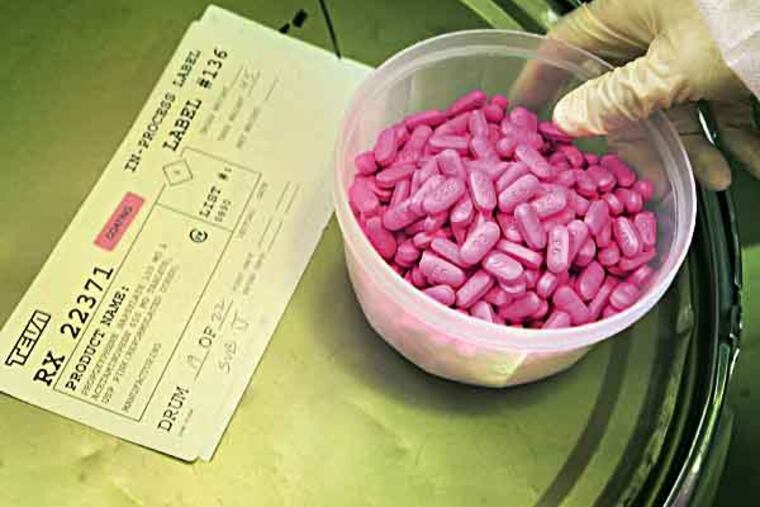Supreme Court to hear case with implications for drug prices
The U.S. Supreme Court will hear arguments Monday in a case that affects the health and wallets of millions of Americans, most of whom know nothing about the contentious issue.

The U.S. Supreme Court will hear arguments Monday in a case that affects the health and wallets of millions of Americans, most of whom know nothing about the contentious issue.
Brand-name and generic pharmaceutical companies are usually competitors. But brand-name companies are increasingly paying generic companies to stay out of the market, delaying the availability of cheaper medicine.
"This matters because drug prices are important to all of us," said Rutgers-Camden law professor Michael Carrier, who co-wrote a friend-of-the-court brief for the case, Federal Trade Commission v. Watson Pharmaceuticals, et al. Carrier wrote on behalf of 117 other law and business professors, and he is one of several Philadelphia-area elements in this legal landscape.
"A lot of us take prescription drugs, and price is a significant factor," Carrier said. "The price difference between a brand-name drug and a generic can be astronomical."
In industry shorthand, the agreements are known as reverse payments, exclusion payments, or pay-to-delay deals.
The FTC says such deals, when they involve payments, violate the Sherman Antitrust Act and cost taxpayers $3.5 billion per year. The commission wants the Supreme Court to overrule the U.S. Court of Appeals for the Eleventh Circuit in Atlanta, the last of three appeals courts to sanction the practice.
Watson, which changed its name to Actavis in January after a merger, and two other generic makers struck a financial deal with Solvay Pharmaceuticals to delay the launch of generic versions of Solvay's AndroGel, a treatment for low testosterone, until 2015.
The Supreme Court ruling, expected by June, "will define how an entire industry does business," said Ralph Neas, leader of the Generic Pharmaceutical Association, which supports Watson - and the status quo.
Pay-to-delay works this way:
The generic company applies to the Food and Drug Administration for approval to sell its version of a brand-name drug, while officially claiming it does not infringe on the patent of the brand-name company. That way, the generic company won't have to wait the sometimes 20 years for the patent to expire. The brand-name company sues. The two sides settle, with a payment from the brand-name company to the generic maker. This delays the launch of the generic drug, allowing the brand-name drug an expanded period of exclusivity on the market.
The majority of deals do not involve a payment, but the increasing frequency of those involving cash is a concern to many on that side of the debate. According to the FTC, in fiscal year 2012, there were 40 such deals, 12 more than the year before, involving 31 products whose sales amounted to about $8 billion.
Teva Pharmaceutical Industries Ltd., which has its Americas headquarters in North Wales, is the world leader in generic-drug sales and was a pioneer in this strategy.
"The interest of consumers and the generic drug industry are aligned when it comes to patent settlements," Teva spokeswoman Denise Bradley said in a statement. "We commit tremendous resources in the pursuit of early entry and when we enter into an agreement that brings our products to the market prior to patent expiration - consumers win."
Teva joined other generic companies in an amicus brief supporting Watson.
"The facts, public policy, and the law don't support the FTC," Neas said, adding that a 1984 law promoting generics worked because 80 percent of prescriptions are generic.
But Carrier, drugstore chains, consumer and doctors groups, and 36 states join the FTC in saying there would be greater savings if not for the cozy deals between the companies that are usually enemies. They are friends again in opposing the FTC.
"Whenever the phone rings in my office, I half expect it to be a call from the Nobel Committee telling me that the FTC has been nominated for a peace prize," then-FTC chairman Jon Leibowitz said jokingly at a generics industry meeting in 2006.
Drug companies stopped laughing on July 16, when the U.S. Court of Appeals for the Third Circuit in Philadelphia ruled the other way in a similar but separate case. Judge Dolores Sloviter wrote that although such arrangements and other legal rulings upholding them "might be good policy from the perspective of name-brand and generic pharmaceutical producers, it is bad policy from the perspective of the consumer."
The Third Circuit Court decision created a conflict between appeals courts, which often prompts Supreme Court review.
The outcome, though, could be decided in an unusual manner, as only eight of the nine justices will participate. A 4-4 decision would preserve the status quo, helping the drug companies.
Justice Samuel Alito, who served on the Third Circuit Court, recused himself without giving a reason.
One possible reason is that Alito has listed stock holdings from drugmaker Bristol-Myers Squibb on recent financial-disclosure forms, as posted on the website opensecrets.org.
In 2009, Bristol-Myers Squibb was ordered to pay a then-record fine of $2.1 million for failure to fully disclose to the FTC the terms of a reverse-payment deal.